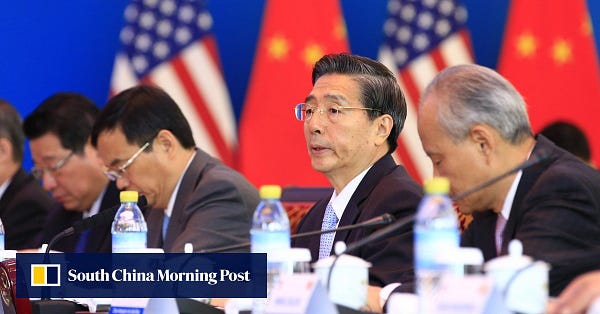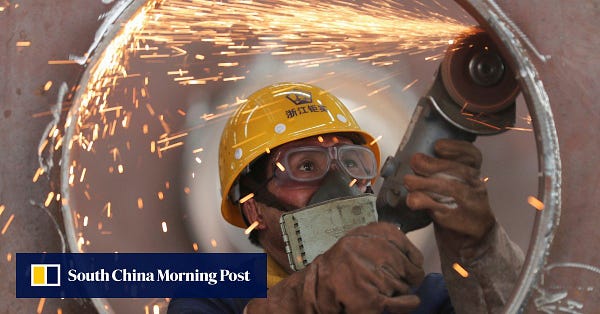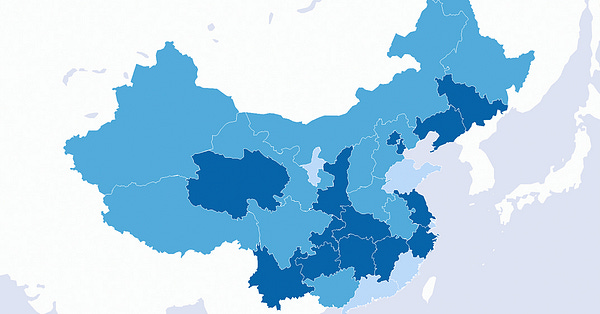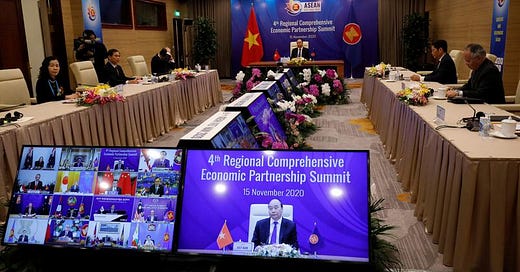Welcome to the latest edition of Trade War, newsletter 46. The big trade news is the creation of the world’s largest trade group, the Regional Comprehensive Economic Partnership (RCEP), one that China is in, but excludes the U.S.
Meanwhile, expectations that a new Biden administration will lead to a serious reset in U.S.-China relations seem overblown. Beijing keeps pushing to build up a domestic chip industry and further signs emerge of the imbalances in China’s fast-recovering economy, amidst growing debt fears.
Cementing China’s position as rules writer
The world’s largest trading group, 15 countries including China, Japan, South Korea, Australia, New Zealand, and Southeast Asian nations, but absent the U.S., was formed last Sunday in Hanoi, Vietnam, reports Reuters.
“RCEP may cement China’s position more firmly as an economic partner with Southeast Asia, Japan and Korea, putting the world’s second-biggest economy in a better position to shape the region’s trade rules,” writes Reuters.


New obstacle to U.S. influence
“The agreement covers more people than any singular regional trade agreement in history, as there are more than 2.2 billion people living in the member states,” reports The Hill, and “sets a new obstacle against U.S. influence in the region.”


Better US-China relations under Biden? Ball’s in Xi’s court
The million dollar question those interested in better Sino-U.S. relations are now considering: will a new Biden administration improve the battered relationship?
Asked about whether Biden should lift the Trump tariffs on China at the virtual Bloomberg New Economy Forum, former USTR Charlene Barshefsky had, I think, the right answer.
The ball is just as much in Beijing's court: "It would be important for China to think about what Xi Jinping would do" to fix the battered relationship..


Running afoul of international norms
A Biden Justice Department is also likely to continue to pursue a wide range of cases against China, including over intellectual property, corporate espionage, hacking, and influence operations on U.S. soil, following the “China Initiative” established under Trump in 2018, reports the Associated Press.
“Even after Democrat Joe Biden’s administration arrives, the law enforcement focus on China may not look radically different, in part because of actions by Beijing that U.S. officials, lawyers and analysts say run afoul of international norms,” writes AP’s Eric Tucker.
China’s orderliness and the West’s chaos
A recent article by a top security official in China has warned that the country’s relationship with the U.S., including through the global supply chain, is a risk to national stability, reports the South China Morning Post.
“Against the backdrop of US-China confrontation, China faces increasing uncertainty and instability in its external environment,” Guo Shengkun, a member of 25-strong Politburo, wrote in an article compiled in a just-published book looking at what the next five years will bring to China.
COVID-19, however, has highlighted Chinese success with failure in the West, he wrote. “During the pandemic, we seized important achievements in a short time and have posed a great contrast between ‘China’s orderliness’ and ‘the West’s chaos’,” he wrote.


China’s quest for tech self-sufficiency
China is continuing to try to ramp up its indigenous chip industry in the face of tech tensions with the U.S., reports the Wall Street Journal’s Liza Lin. Already nearly $38 billion has been raised through stock offerings and asset sales, says S&P Global Market Intelligence—more than double last year’s total.
“China is investing heavily in computer chips and stepping up efforts to cultivate homegrown talent as it accelerates its quest for technological self-sufficiency amid a tech trade war with the U.S.”


China’s lopsided recovery
Even as China’s economy showed strong growth in October, there were signs of the continuing unbalanced recovery, reports the South China Morning Post.
While industrial production grew 6.9 percent, beating analyst expectations, retail sales grew less at 4.3 percent, and missed predictions of 5 percent growth.
Meanwhile, fixed asset investment grew by 1.8 per cent over the first 10 months of 2020, ahead of the expected 1.6 percent growth, “powered by a huge uptick in investment in the primary industries – such as mining, farming, quarrying – and hi-tech sectors,” the Hong Kong paper writes.


Corporate defaults sparking new debt fears
A Chinese chipmaker, an auto venture that makes BMWs, and a coal miner are all among the government-owned companies that have recently defaulted or delayed debt repayments, sparking renewed fears about China’s heavy debt burdens.
“A series of high-profile defaults involving state-owned companies in China — normally a safe pick for investors — have jolted the credit market and rattled investors,” reports CNBC.
“The pandemic and increasingly stringent regulations from central authorities could restrain local governments’ power to coordinate financial resources, and even the willingness to provide support,” S&P Global Ratings said.
LGFVs rear their ugly heads again…
And for another kind of worrisome debt—that held by China’s local administrations through LGFVs or local government financing vehicles - check out this interactive map from MacroPolo which shows the situation by province (Guizhou, the poor interior province I wrote much about in my recent book, turns out is the worst of all.)


Notable/In Depth
Here is a good (and long) thread on RCEP and how to understand its importance, from Carnegie Endowment’s Evan Feigenbaum.

Here’s a new bipartisan report on what the U.S. needs to do to meet the Chinese science and technology challenge, put out by UC San Diego and the Asia Society Center on U.S.-China Relations.

A chart and report from MacroPolo that illustrates Silicon Valley’s changing views on China: from copycat to in-China competitor to global competitor..



